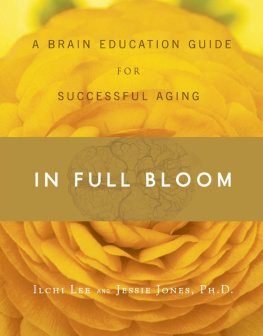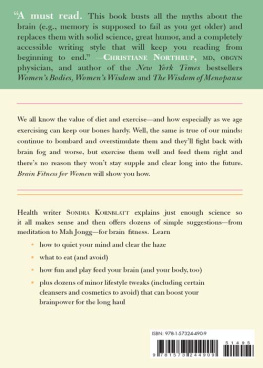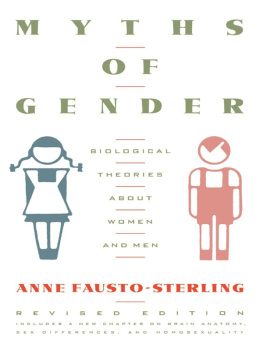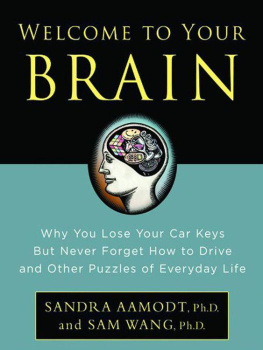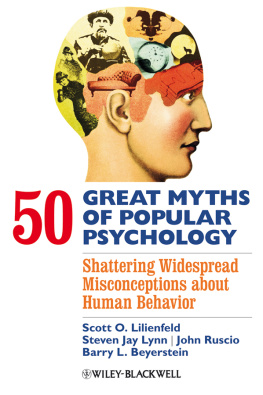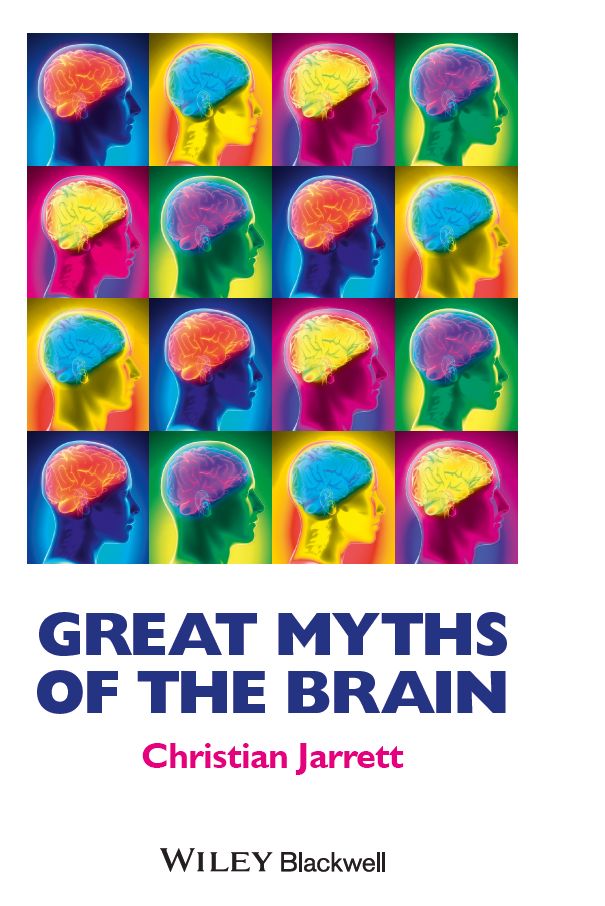
CONTENTS
Guide
Pages
Praise for Great Myths of the Brain
The more we are interested in the brain and how it explains our behavior, the more important it is that we rid ourselves of untruths and half-truths. Myth-buster extraordinaire, Christian Jarrett is an engaging and knowledgeable guide who spring-cleans the cobwebs of misinformation that have accumulated over recent years. You will be surprised at some favorite beliefs that turn out to be scare stories or wishful thinking. Yet Jarrett conveys a strong optimism about fresh approaches that will result in new knowledge. All claims are well substantiated with references. It will be fun to learn from this book.
Professor Uta Frith DBE, UCL Institute of Cognitive Neuroscience
Christian Jarrett is the ideal guide to the fascinating, bewildering, and often overhyped world of the brain. He writes about the latest discoveries in neuroscience with wonderful clarity, while cleanly puncturing myths and misinformation.
Ed Yong, award-winning science writer, blogger, and journalist
Great Myths of the Brain provides an incredibly thorough and engaging dismantling of neurological myths and misconceptions that abound today. For anyone overwhelmed by copious bogus neuroscience, Christian Jarrett has generously used his own mighty brain to clear this cloud of misinformation, like a lighthouse cutting through the fog.
Dr Dean Burnett, Guardian blogger, Cardiff University
Lots of people cling to misconceptions about the brain that are just plain wrong, and sometimes even dangerous. In this persuasive and forceful book, Christian Jarrett exposes many of these popular and enduring brain myths. Readers who want to embrace proper neuroscience and arm themselves against neurononsense will enjoy this splendid book, and profit greatly from doing so.
Elizabeth F. Loftus, Distinguished Professor, University of California, Irvine
Christian Jarrett, one of the world's great communicators of psychological science, takes us on a neuroscience journey, from ancient times to the present. He exposes things we have believed that just aren't so. And he explores discoveries that surprise and delight us. Thanks to this tour de force of critical thinking, we can become wiser by being smartly skeptical but not cynical, open but not gullible.
Professor David G. Myers, Hope College, author, Psychology, 11th edition
A masterful catalog of neurobollocks.
Dr Ben Goldacre, author of Bad Science and Bad Pharma
In this era of commercialized neurohype, Christian Jarrett's engaging book equips us with the skills for spotting the authentic facts lost in a sea of brain myths. With compelling arguments and compassion for the human condition, Jarrett teaches us that the truth about the brain is more complicated, but ultimately more fascinating, than fiction.
The Neurocritic, neuroscientist and blogger
Christian Jarrett has written a wonderful book that is as entertaining as it is enlightening. When it comes to brain science, a little knowledge is a dangerous thing. Jarrett has done us all a great service by peeling back the layers of hype to reveal what we really do know and don't know about how the brain functions.
Professor Christopher C. French, Goldsmiths, University of London
Great Myths of the Brain is essential reading for anyone who wants to navigate the maze of modern neuroscience, separating fact from fiction and reality from hype. Jarrett is an insightful, engaging guide to the mysteries of the human mind, providing an always smart, often humorous account that will equip you with the tools you need to understand both the power and the limitations of your own mind.
Maria Konnikova, author of Mastermind: How to Think Like Sherlock Holmes
Great Myths of Psychology
Series Editors
Scott O. Lilienfeld
Steven Jay Lynn
This superb series of books tackles a host of fascinating myths and misconceptions regarding specific domains of psychology, including child development, aging, marriage, brain science, and mental illness, among many others. Each book not only dispels multiple erroneous but widespread psychological beliefs, but provides readers with accurate and up-to-date scientific information to counter them. Written in engaging, upbeat, and user-friendly language, the books in the myths series are replete with scores of intriguing examples drawn from everyday psychology. As a result, readers will emerge from each book entertained and enlightened. These unique volumes will be invaluable additions to the bookshelves of educated laypersons interested in human nature, as well as of students, instructors, researchers, journalists, and mental health professionals of all stripes.
www.wiley.com/go/psychmyths
Published
50 Great Myths of Popular Psychology
Scott O. Lilienfeld, Steven Jay Lynn, John Ruscio, and Barry L. Beyerstein
Great Myths of Aging
Joan T. Erber and Lenore T. Szuchman
Great Myths of the Brain
Christian Jarrett
Forthcoming
Great Myths of Child Development
Steven Hupp and Jeremy Jewell
Great Myths of Intimate Relations
Matthew D. Johnson
Great Myths of Personality
M. Brent Donnellan and Richard E. Lucas
Great Myths of Autism
James D. Herbert
Great Myths of Education and Learning
Jeffrey D. Holmes and Aaron S. Richmond
50 Great Myths of Popular Psychology, Second Edition
Scott O. Lilienfeld, Steven Jay Lynn, John Ruscio, and Barry L. Beyerstein
Great Myths of the Brain
Christian Jarrett
This edition first published 2015
2015 Christian Jarrett
Registered Office
John Wiley & Sons Ltd, The Atrium, Southern Gate, Chichester, West Sussex, PO19 8SQ, UK
Editorial Offices
350 Main Street, Malden, MA 02148-5020, USA
9600 Garsington Road, Oxford, OX4 2DQ, UK
The Atrium, Southern Gate, Chichester, West Sussex, PO19 8SQ, UK
For details of our global editorial offices, for customer services, and for information about how to apply for permission to reuse the copyright material in this book please see our website at www.wiley.com/wiley-blackwell.
The right of Christian Jarrett to be identified as the author of this work has been asserted in accordance with the UK Copyright, Designs and Patents Act 1988.
All rights reserved. No part of this publication may be reproduced, stored in a retrieval system, or transmitted, in any form or by any means, electronic, mechanical, photocopying, recording or otherwise, except as permitted by the UK Copyright, Designs and Patents Act 1988, without the prior permission of the publisher.
Wiley also publishes its books in a variety of electronic formats. Some content that appears in print may not be available in electronic books.
Designations used by companies to distinguish their products are often claimed as trademarks. All brand names and product names used in this book are trade names, service marks, trademarks or registered trademarks of their respective owners. The publisher is not associated with any product or vendor mentioned in this book.
Limit of Liability/Disclaimer of Warranty: While the publisher and author have used their best efforts in preparing this book, they make no representations or warranties with respect to the accuracy or completeness of the contents of this book and specifically disclaim any implied warranties of merchantability or fitness for a particular purpose. It is sold on the understanding that the publisher is not engaged in rendering professional services and neither the publisher nor the author shall be liable for damages arising herefrom. If professional advice or other expert assistance is required, the services of a competent professional should be sought.
Next page

